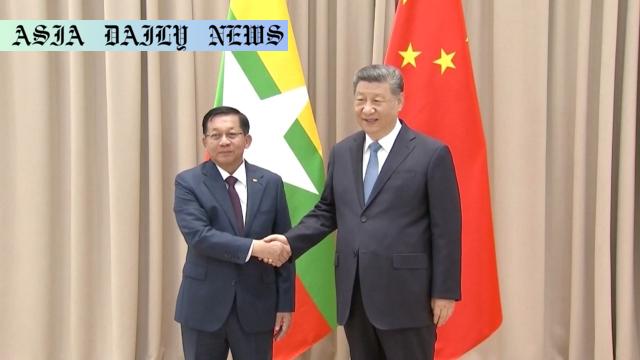Myanmar-China relations are being bolstered as military chief meets Xi Jinping, marking progress in trade, energy, and infrastructure.
- Myanmar’s military chief met China’s president for the first time since the 2021 coup.
- Discussions included trade, energy, and infrastructure projects.
- China reiterated its support and commitment to Myanmar’s reconstruction.
- Myanmar aims to strengthen ties amid its political isolation.

Introduction
Myanmar’s military chief, General Min Aung Hlaing, recently held his first significant meeting with Chinese President Xi Jinping since the country’s 2021 military coup. This meeting underscores a burgeoning alliance between Myanmar and China as the Southeast Asian country faces increasing pressure and isolation from the West. Held during the general’s visit to Moscow, the meeting spotlighted crucial discussions on trade, energy, and infrastructure projects, signaling deeper cooperation between the two nations.
The Significance of the First Meeting Since the 2021 Coup
The engagement comes as Myanmar continues to grapple with its political and economic challenges following the military-led overthrow of its democratically elected government in 2021. With mounting sanctions and criticisms from Western nations, the country has leaned heavily on regional powers, particularly China, to offset this isolation. The meeting reflects Myanmar’s desire to showcase its strong diplomatic ties with one of the world’s most influential nations, as well as to highlight a path forward that reframes its regional position.
Key Areas of Cooperation: Trade, Energy, and Infrastructure
The discussions between General Min Aung Hlaing and President Xi Jinping focused on several areas for bolstering bilateral cooperation. Central to these were agreements on economic trade and energy development. Additionally, both sides emphasized the urgency to move forward with key infrastructure projects, particularly transportation initiatives connecting the two nations. These developments are part of China’s wider Belt and Road Initiative, a global strategy aimed at enhancing connectivity and economic integration across regions.
China’s Commitment to Myanmar’s Reconstruction
China’s President reaffirmed his country’s commitment to assisting Myanmar in its ongoing reconstruction efforts. This involves both providing immediate humanitarian aid, such as support for earthquake-affected areas, and ensuring long-term investments in sustainable infrastructure. Such assurances from China serve as a diplomatic lifeline for Myanmar, offering a crucial economic partnership amidst its struggles with political legitimacy on the global stage.
Myanmar’s Strategic Approach to Breaking Isolation
For Myanmar, this meeting holds significance beyond diplomatic gestures. By enhancing its relationship with China, the military administration seeks to showcase its ability to attract major global allies despite international sanctions. The cooperative agreements finalized during the visit will also serve to bolster Myanmar’s economic stability and domestic development, addressing some of the criticisms concerning governance and economic shortcomings since the coup.
The Role of the Belt and Road Initiative
The Belt and Road Initiative (BRI) continues to serve as a cornerstone in Myanmar-China relations. Many of the discussed projects align with the initiative’s goals of fostering economic links across Asia through infrastructure. This includes railways, highways, and increased trade routes, which would directly connect Myanmar to key economic zones in China. However, while the BRI offers numerous benefits, it remains to be seen how these joint efforts will address criticism regarding transparency and equitable distribution of resources in Myanmar.
Challenges Ahead for Myanmar-China Relations
While the discussions reflect a strengthening partnership, challenges remain. Concerns over how Myanmar will navigate its political climate, ongoing humanitarian crises, and Western sanctions will influence the trajectory of its relationship with China. Furthermore, Myanmar must ensure that its plans for socioeconomic development through partnerships like the BRI do not alienate its own citizens, many of whom oppose the current military regime.
Conclusion
The recent meeting between Myanmar’s military chief and President Xi Jinping is a visible step toward deepening bilateral relations in the face of substantial challenges. With cooperative agreements in trade, energy, and infrastructure, Myanmar hopes to secure economic stability while projecting a stronger regional presence. Simultaneously, China sees its relationship with Myanmar as a strategic partnership in furthering its Belt and Road ambitions. As these two nations move forward, the effectiveness of their collaboration will be instrumental in shaping the region’s future dynamics.



Commentary
Myanmar-China Relations: A Diplomatic Strategy Amidst Isolation
The meeting between Myanmar’s military chief and President Xi Jinping illustrates a calculated diplomatic strategy on Myanmar’s part. Following its 2021 coup, the nation has struggled with global isolation, economic downturns, and growing internal unrest. By aligning itself with China, Myanmar seeks to project a semblance of legitimacy and stability—an overt message aimed at countering the narrative set by Western nations that often frame the military-led administration in a negative light.
China’s Strategic Interests in Southeast Asia
From China’s perspective, its commitment to Myanmar aligns with larger geopolitical interests. Myanmar is geographically crucial to China’s Belt and Road Initiative, acting as both a gateway to the Indian Ocean and a region through which critical infrastructure projects can flow. By strengthening ties with Myanmar, China not only secures an avenue for increased economic activity but also widens its influence in the region amidst growing competition with Western nations.
Balancing Economic Growth and Political Challenges
While the cooperation between the two nations is promising in terms of economic ventures, it is not without complexities. Myanmar’s military government must balance its eagerness to collaborate with China against domestic resistance to foreign involvement in local projects—particularly if such projects fail to deliver tangible benefits to its people. Missteps in managing public perception or ignoring local needs could further alienate the military regime from its population.
The Bigger Picture: Regional Impacts
Looking ahead, the Myanmar-China relationship holds potential to reshape regional dynamics in Southeast Asia. Whether this occurs through fostering economic connectivity or realigning geopolitical alliances, the developments resulting from this visit will likely reverberate across Asia. However, both parties must tread carefully to ensure that cooperation brings long-term benefits without exacerbating existing tensions or inequalities.